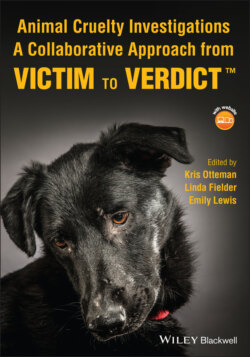Читать книгу Animal Cruelty Investigations - Группа авторов - Страница 186
6.10 How Animal Cruelty Investigations Surface and Become Active Cases
ОглавлениеInvestigation of animal cruelty or neglect cases begins with a report from one or several sources. Private citizens are the eyes and ears of our communities and the most common reporters of suspected animal crimes. Local agencies responsible for investigating or referring these cases compile the information and determine what complaints to act upon. Most complaints are collected via phone or website reporting mechanisms. Private community practice and specialty practice veterinarians are also on the front line in recognizing and reporting animal neglect or abuse. Veterinary professionals, including doctors and staff, are more fluent in recognition and reporting of animal cruelty in recent years and may initiate a report that leads to an investigation. Other sources include humane agencies, animal control organizations, agriculture affiliates, social workers, and other in‐home vendors such as meter readers and repair personnel who may notice and report an animal at risk or suspicious activities.
Some agencies are dedicated to the investigation of animal crimes and others are a specialized department within an organization. All government law enforcement agencies, whether local, state, or federal, are sworn to uphold all laws including those relating to animal theft, abuse, and other protections. Animal control agencies are on the front line in cities and counties to enforce animal cruelty laws in some jurisdictions and to educate on animal ordinances such as barking or managing stray dogs, cats, or other animals. Animal control agencies may be called upon to evaluate and lead or partner on investigating and responding to potential criminal animal crimes.
A wide range of concerns are reported for investigations, some of which fall into the category of an enforceable law, while others do not. For example, keeping a dog on a tether in a yard without shelter may not be against a code or law in some areas and is a violation of the law in other geographic areas. Common concerns include sanitation, husbandry, shelter, starvation, hoarding, abuse, lack of socialization, and organized fighting. These reports are typically evaluated and triaged by the organization to which they are reported. Agencies prioritize response based on legal requirements and resources available. Being accessible and willing to help is one of the most important attributes the veterinarian brings to the fight against animal cruelty.
